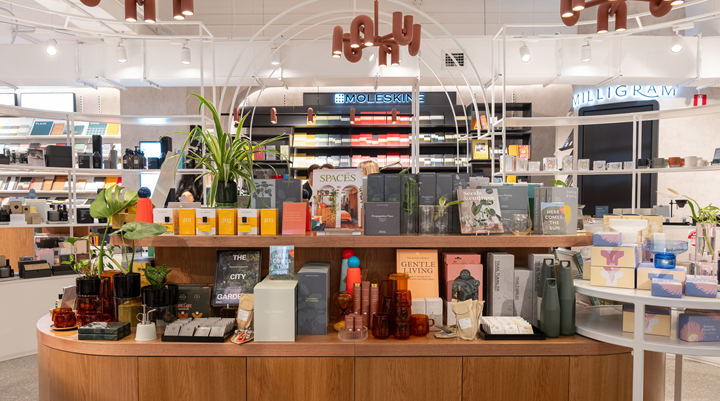There’s a term the Japanese use to describe finding beauty in everyday objects – ‘wabi-sabi’. The meaning runs a little deeper than that, but wabi-sabi is essentially what Milligram, a retailer of stationery and other personal goods, is all about. The business was started in 2007 by Scott Druce and Matt Harris. Back then, it was called NoteMaker, and it was run from Druce’s kitchen table. Fast forward to 2023, and the company was renamed Milligram to better reflect what it does,
s, and it now combines e-commerce with physical retail stores.
At the time of writing, Milligram had six locations in Melbourne, a seventh in George Street, Sydney, and was on the cusp of opening an eighth in the cosmopolitan inner west Sydney suburb of Newtown.
“Before we did physical retail, we sold – and continue to sell – into about 1400 retailers across Australia and New Zealand,” Druce said.
The bricks-and-mortar piece
The third-party retailers Milligram sells into include Officeworks, David Jones and Myer, and it was this experience that gave the management team the appetite to move beyond e-commerce into physical retail. “We gained a lot of experience in that as part of the business, and we really wanted to come into the physical space,” Druce said.
“It was an evolution for the growing business and us becoming more confident about retail.” E-commerce, he added, only takes you so far, and physical retail is a great way to connect with customers and be part of their journey.
Milligram is looking to add another four stores to its retail network, but with this comes another challenge: how to curate the stock mix in the stores, given e-commerce allows an almost infinite number of products, but in a shop, shelf space is limited.
The retail presence, Druce said, is not cookie-cutter. Milligram uses a designer to tailor each store to its location and demographic. And the demographic is an important consideration when it comes to stock.
Each store has a core range and from there, it depends on the people who come through the door. The Bourke Street, Melbourne, location, for example, attracts lots of tourists and students, so the travel category is twice as large as other stores in the network.
But being an e-commerce retailer also means if a customer comes in and what they want is not in stock, it’s just a matter of ordering it from the warehouse and having it shipped, either to the customer’s home or back to the store for click-and-collect.
“You only have so much room in-store,” Druce said, and with the e-commerce component Milligram can meet its customers’ needs, regardless of whether an item is physically in stock or not.
Cost-of-living crisis not a factor in growth
Druce said the cost-of-living crisis hasn’t had a great impact on the business, and this comes down to the demographic the company serves. A large proportion of its customer base is either Millennial or Gen Z, and those generations aren’t experiencing the same interest rate-led challenges as older demographics. The reason, Druce said, is home ownership levels are lower among this group.
Another factor, post-Covid, is Milligram’s CBD locations, which have been experiencing growth in foot traffic since the health crisis eased, Druce said. “If you look at suburban shopping centres, they’ve experienced at least a 10 per cent decline in traffic, but CBD locations have grown.”
Immigration and international student numbers have also bounced back, helping the bottom line, as the people who fall into those categories are looking for high-quality products and a retail environment suiting their mindset and interests.
It’s the desire for high quality and a passion for sustainability driving market trends in Milligram’s space, Druce said.
“We frequently survey our customers and sustainability is one of their top two or three priorities.”
Also driving trends in its market is the omnichannel experience, he said. Customers want to start their journey in one place, be it online or in-store, and then complete it elsewhere. “We have to make sure the online experience is closely aligned to the in-store experience, so it makes sense for the customer and it’s easy for them to make a transaction.”
Challenges and opportunities
The first market challenge Druce sees is that retail is generally flat, and there’s not a lot of growth for some retailers in the market. “We’re doing well, and that comes down to our demographic, products and location, but it’s certainly a bit bleak out there.”
A second challenge is the shift by some retailers to become vertically integrated, something Milligram will avoid so it’s able to offer the broadest product range to its customers.
“This is a real opportunity for us because we’re a multi-brand business, but vertical integration definitely challenges the retail landscape.”
To navigate these challenges, Druce said Milligram will look at providing its customers with more value but will avoid discounting. It could come through bundling, a gift with purchase or free shipping, he said.
“We’re also constantly reviewing the range. We’re a product-led business and while some businesses are marketing-led, or guided by aesthetics, we’re always about the technical and functional aspects of our products,” he said.
In the end, Milligram is about wabi-sabi. It’s about selling beautiful, functional goods to a discerning demographic, one that’s concerned about function, sustainability and style.
“The customer mindset is constantly evolving, and so we have to be really connected with what they want.”
This story first appeared in the 2024 Australian Retail Outlook.

